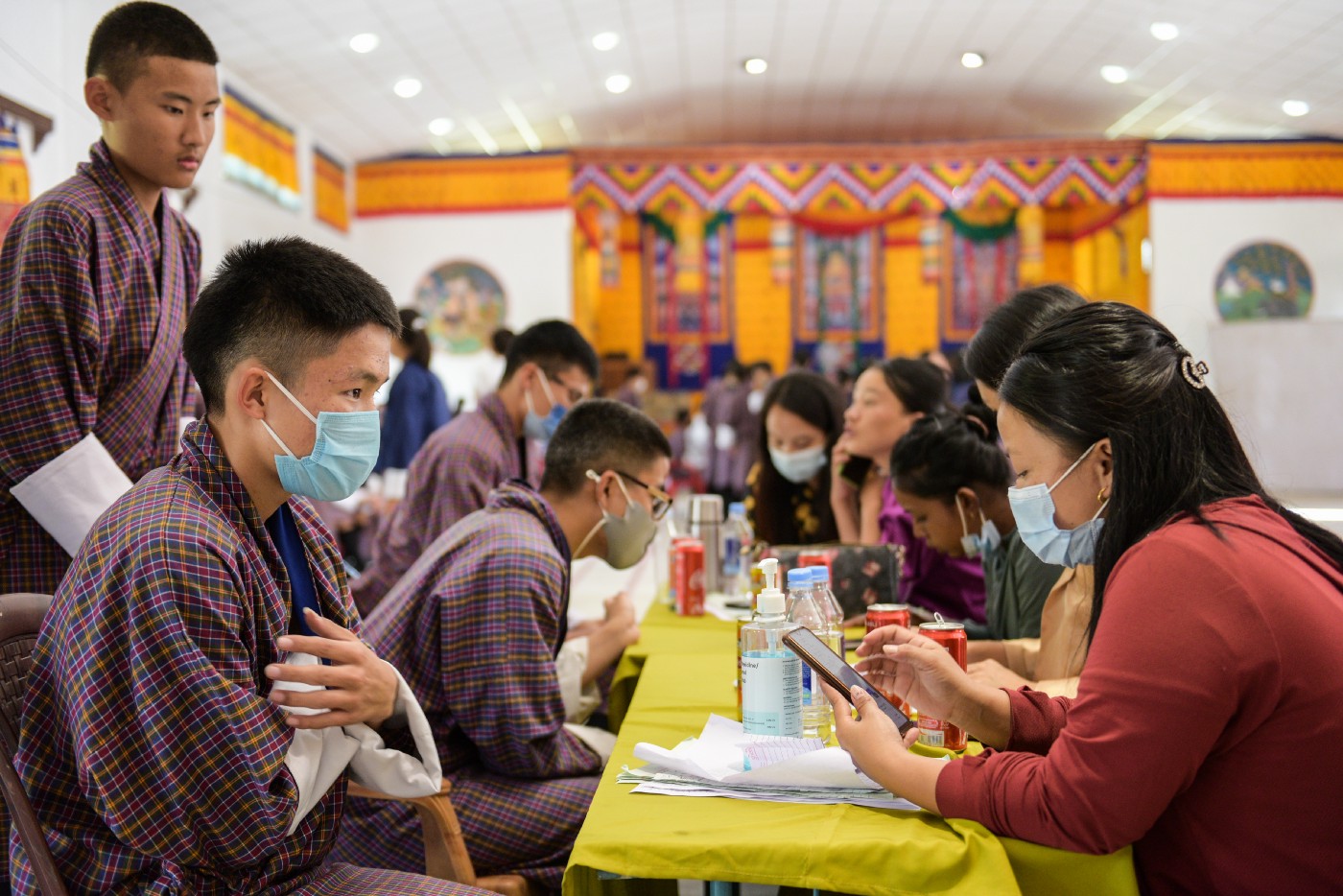Digital solutions for improved vaccine access
November 22, 2022
Health workers in Indonesia use the SMILE cloud-based digital system for vaccine management.
Vaccines are widely regarded as one of the greatest advances in global health and development, protecting children and communities from deadly and disabling diseases. As has been well demonstrated by the COVID-19 pandemic, vaccines are also critical to the prevention and control of infectious diseases, and a cornerstone of global health security.
Digital tools have shown great promise in enhancing the efficiency of vaccination systems in low- and middle-income countries (LMICs). The UNDP-led Access and Delivery Partnership (ADP) is actively supporting countries to identify and adopt the appropriate digital solutions.
In 2014, the Government of India, with support from UNDP and Gavi, the Vaccine Alliance, embarked on a journey to digitize its vaccine supply chain network through the Electronic Vaccine Intelligence Network (eVIN). Since then, the cloud-based system has made significant contributions to the immunization programmes in India.
The system strengthens the vaccine supply chain by digitizing information on vaccine stocks and storage temperatures. eVIN has transformed the entire vaccination system in India, from vaccination registration and scheduling to monitoring and tracking of possible side effects, strengthening cold chain and logistics management, generating real-time reports and producing vaccine certificates. Artificial intelligence and big data analytics also support decision-making and targeting of the most vulnerable for vaccination. It has been successfully implemented for vaccine stocks at all 28,000 storage centres across the country.
The eVIN experience has shown that digitized information systems are critical for driving the rapid, safe and equitable deployment of vaccines, which in turn can enhance health system preparedness and resilience. ADP has collaborated with UNDP India to facilitate South–South technical cooperation and transfer of technical know-how to other LMICs to enable accelerated uptake.
ADP has also supported the documentation of digital good practices, strategies and lessons learned to improve policymaking and planning for the introduction of new vaccines, particularly for countries exploring digital solutions to support distribution of COVID-19 vaccines.
In Indonesia, beginning in 2018, ADP partnered with UNDP Indonesia to support the Ministry of Health and the national immunization programme with a pilot cloud-based digital system, based on eVIN, under the name Sistem Monitoring Imunisasi Logistik secara Elektronik (SMILE). The pilot’s success has led to its rapid scale-up to 10,000 primary health centres in 34 provinces across the country.
Primary health care staff using the SMILE app in Gorontalo province, Indonesia.
The COVID-19 pandemic attested to the critical role of the digital vaccine systems in India and Indonesia. The earlier investments in digital vaccine management and delivery systems in both countries enabled the swift pivoting of the systems to manage and deliver COVID-19 vaccines once they were available. They provided the essential foundation on which the much larger, population-wide COVID-19 vaccination programmes could be formed.
In India, the COVID Vaccine Intelligence Network (CoWIN) facilitates all aspects of the vaccination process, including registrations, immunizations, appointments management, and issuing of digital vaccine certificates. Since its launch in January 2021, the CoWIN system has registered 1.1 billion people (84 percent of the country’s total population) for COVID vaccination and been used to deliver 2.04 billion doses, resulting in over 855 million people being fully vaccinated (two doses) as of July 2022.[1]
SMILE has also been adapted to support COVID-19 vaccine delivery in Indonesia, facilitating the administration of 429 million vaccine doses and the full vaccination of 171 million people (as of July 2022).[2]
The experiences of India and Indonesia in repurposing eVIN and SMILE, respectively, for inventory management and delivery of COVID-19 vaccines offer valuable lessons for other countries. ADP has helped to facilitate the transfer of knowledge and technical know-how to other LMICs.
One of the first recipients of the transfer of technical know-how was Bhutan, which successfully set up its Bhutan Vaccine System and immunized its population against COVID-19 at a remarkable speed, including by providing the first dose of vaccine to 99 percent of children aged 12–17 over a four-day span in September 2021.
Under the Bhutan Vaccine System, 719,000 people (93 percent of the total population) have been registered, 2.1 million doses have been administered, and 671,000 people have been fully vaccinated with two doses (as of July 2022).

Teachers and health workers pre-screen students using the Bhutan Vaccine System during a COVID-19 vaccine campaign at Bajo Higher Secondary School, Wangduephodrang.
The successful vaccination drives and high vaccination coverage, aided by the operational and systemic efficiencies provided by the digital systems, have greatly benefited Bhutan, India and Indonesia, and helped enable quick economic recovery.
Looking ahead, ADP will continue its support to countries to identify and implement digital solutions for vaccine delivery. This is complementary to the global UNDP approach towards support for national COVID-19 vaccine deployment plans, which focuses on three core elements: digital solutions for vaccine delivery and systems-strengthening; integrated data analytics to support decision-making for vaccine equity; and greening of COVID-19 vaccination.
[1] Real-time data are available on the CoWIN website: https://dashboard.cowin.gov.in/.
[2] Real-time data are available on the SMILE website: https://vaksin.kemkes.go.id/#/vaccines.
Further information:
UNDP, ‘Improving vaccination systems - EVIN’
Ministry of Health and Family Welfare, ‘Co-WIN Global Outreach Program’
UNDP, ‘Indonesia recognizes digital champions on health and vaccination drive through SMILE’, 9 August 2022
UNDP, ‘Building Digital Public Goods: takeaways from India’s COVID-19 vaccine implementation programme’, 1 February 2022
UNDP, ‘Support to Vaccine Equity | Beyond Recovery: Towards 2030’, 17 June 2021
UNDP, ‘A New Digital System Drives Bhutan’s COVID-19 Vaccination Success’, 30 July 2021
UNDP, ‘The digital COVID vaccine system in Bhutan that ensures no one is left behind’, 1 October 2021
UNDP, ‘Indonesian President highlights the importance of vaccine temperatures ahead of COVID-19 immunization drive’, 19 November 2020
This is part of a collection of impact stories highlighting the work of the Access and Delivery Partnership in ensuring access to health technologies for those in need. For more information and to read additional impact stories, please visit the ADP website.

 Locations
Locations





